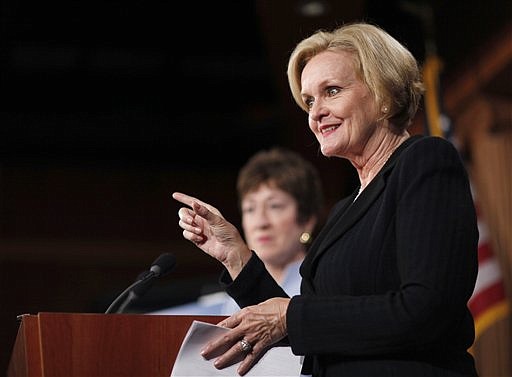U.S. Sen. Claire McCaskill sums up her five years as a Democratic senator from Missouri with one word: watchdog. She uses another to describe her 2012 re-election campaign: underdog.
McCaskill, who has survived several decades in politics as a lawmaker, prosecutor and auditor, is heading into a challenging campaign year against an economic headwind that may imperil incumbents - particularly those linked to a still unpopular president in an unpredictable swing state such as Missouri. Her hopes for victory may hinge on her ability to persuade voters that she has served as their government watchdog in Washington, D.C.
"I think if they look at the work product, they will see that I have been tenacious and aggressive and sometimes been lonely in terms of positions I've taken on some of this stuff," McCaskill told The Associated Press.
Three candidates - U.S. Rep. Todd Akin of suburban St. Louis, former state Treasurer Sarah Steelman of Rolla, and St. Louis area businessman John Brunner - are competing in a GOP primary for the right to take on McCaskill in the November general elections.
The U.S. Senate race, which early opinion polls suggest will be close, will top a full Missouri ballot that also features Democratic Gov. Jay Nixon's re-election bid, races for four other statewide executive offices and contests for newly redrawn districts for the U.S. Congress and the state Legislature. At the bottom of the ballot are likely to be several contentious questions, such as whether Missourians can be required to show a photo ID at the polls. And, of course, Missouri figures to again be in play for President Barack Obama's re-election bid against a still-to-be-determined Republican challenger.
McCaskill was one of the first sitting senators to endorse Obama's presidential campaign in 2008. She also has supported two of his most high-profile policy initiatives - the 2009 stimulus act and the 2010 health care overhaul. Although Obama narrowly lost Missouri in 2008 and has remained generally unpopular in the state, McCaskill says she has personally asked him to campaign with her in Missouri and has no plans to turn her back on a president she still considers a friend.
McCaskill's Republican challengers - who she says all "qualify as extreme voices" - have eagerly highlighted her ties to Obama. Brunner, who is pouring his own money into his campaign, already has been running ads stressing the Obama-McCaskill connection.
Republicans also already are going right at McCaskill's perceived strength, challenging her claims as a crusader for good government and a protector of taxpayer money. They highlight her support for Obama initiatives like the stimulus which have driven up the deficit.
When McCaskill claimed victory in December for banishing spending earmarks from a Department of Defense bill, the Missouri Republican Party quickly responded with a pre-Christmas Internet video characterizing her as "Chameleon Claire" for having supported bills containing spending earmarks in the past.
"After voting for thousands of earmarks that cost taxpayers billions of dollars, Claire McCaskill now claims she wants to ban them. Her hypocrisy proves once again that Missourians simply cannot trust Chameleon Claire," Lloyd Smith, executive director of the Missouri Republican Party, said in one of several similar news releases targeting the senator.
McCaskill explained that, yes, she has voted for federal spending bills that contained earmarks although she has consistently spoken against them since she first ran for Senate in 2006. To vote against an entire defense or agriculture funding bill would have been counterproductive, she said, and could have led to Republican criticism that she didn't support farmers, pay raises for the military or a variety of other worthwhile items in the bills.
"I decided I was going to crusade against the process of earmarking, but I wasn't going to sit out my entire Senate career by refusing to vote on anything that had one," McCaskill said.
McCaskill emphasizes that she is no newcomer in the push for government accountability and frugality. She rattles off a list of achievements. As a freshman in 2007, she co-sponsored the creation of the independent Commission on Wartime Contracting to investigate how money was being spent in Iraq and Afghanistan. In 2008, she co-sponsored a measure that strengthened the role of inspectors general in federal agencies. In 2009, she became chairman of the new Subcommittee on Contracting Oversight, a perch she has used to target the contracting preferences given to Alaskan Native companies. Last year, McCaskill's committee held hearings on alleged contract mismanagement at Arlington National Cemetery.
Political science professor Dave Robertson, of the University of Missouri-St. Louis, figures McCaskill and her eventual Republican opponent both will enter the general election campaign with about 45 percent support. That leaves a swing vote of about 10 percent, which Robertson said more than likely will be swayed by national economic trends or some unforeseen event before Election Day.
If unemployment is high, consumer confidence is low and the economy is a disaster come fall, it's going to be very hard for McCaskill to win, Robertson said. But if the economy remains merely murky, and Obama's popularity hasn't tanked, McCaskill's emphasis on her role as a government watchdog could make a difference.
"It's a good strategy," Robertson said. "Harry Truman did this kind of stuff when he was a senator. I think it goes over fairly well with people in Missouri."

